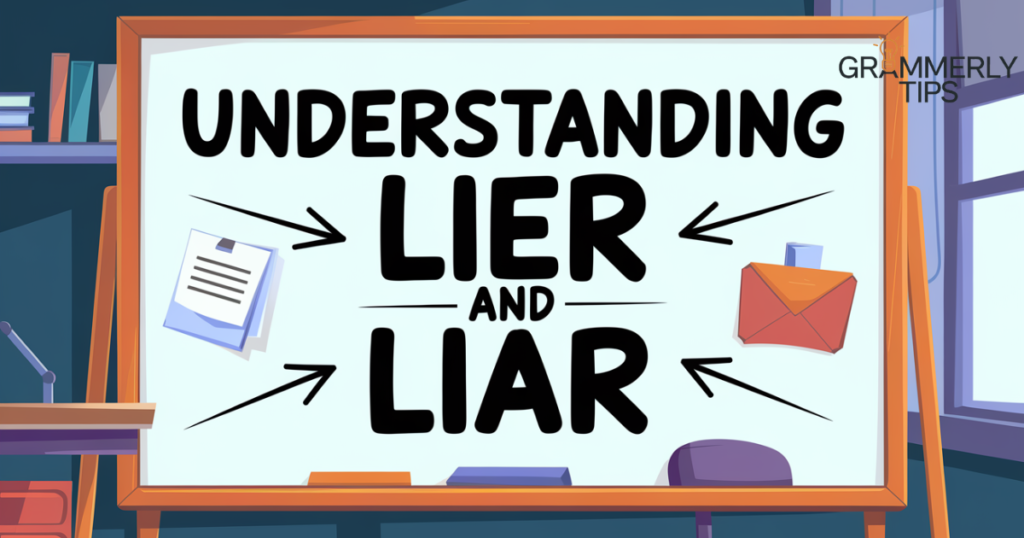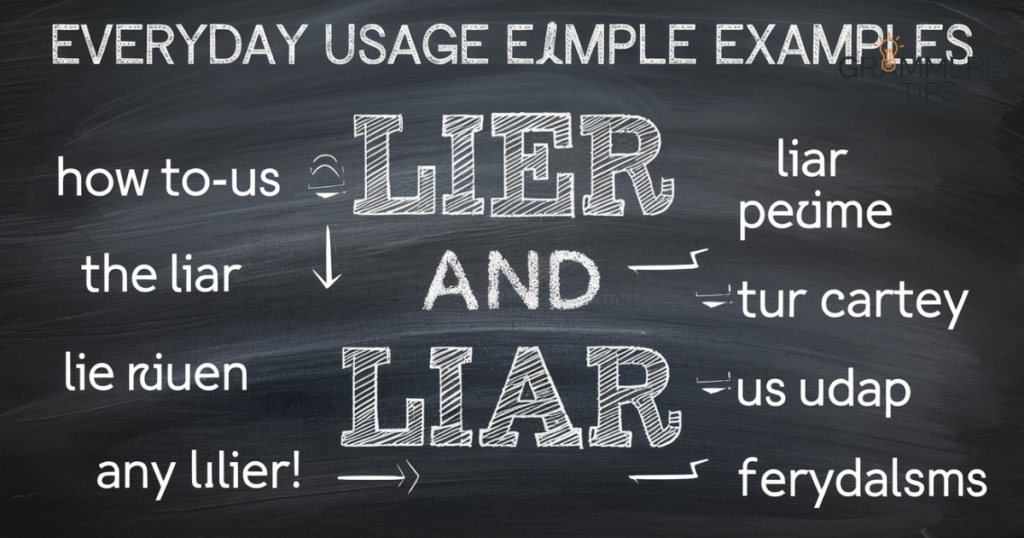The English language can be tricky, especially when it comes to words that look or sound alike but have different meanings. Lier or liar are two such words that often confuse people. While they may seem similar, they have distinct definitions and uses.
Understanding the difference between lier or liar is essential for clear communication. This guide will explain what each word means, how to use them correctly, and provide examples to help you master their usage.
Lier Or Liar: What’s The Difference?
“Lier” and “liar” may sound alike, but they have very different meanings. A lier refers to someone or something that lies down, like resting or reclining. On the other hand, a liar is a person who tells lies or is dishonest. These words aren’t interchangeable, so using the correct one is important.
For example, “The dog is a lier on the couch,” refers to lying down, while “He’s a liar about his story,” means dishonesty. Remembering their meanings can help you avoid common mistakes and communicate clearly.
Understanding Lier and Liar

Liar: Definition and Usage
A liar is someone who intentionally tells falsehoods or deceives others. The word describes a person who habitually lies or speaks dishonestly. For example, “She was called a liar for denying the obvious truth.”
It’s often used in both casual and formal contexts to highlight dishonesty. Understanding this term helps in identifying its specific use in communication.
For Example
- Everyone knew he was a liar when his stories never matched the facts.
- Being called a liar is a serious accusation that can damage a person’s reputation.
- She promised to stop being a liar and start telling the truth.
These examples illustrate how the word liar is used to describe someone dishonest or untruthful. They highlight its application in different scenarios, from accusations to personal behavior.
Lier: Definition and Usage
A lier refers to someone or something that lies down or rests in a horizontal position. It’s a less common word compared to “liar” and is typically used in descriptive or literary contexts. For example, “The cat is a quiet lier on the windowsill.”
The term focuses on the physical act of reclining or being stationary. Understanding its meaning ensures it’s not confused with “liar,” which implies dishonesty.
For Example
- The child, a silent lier on the couch, appeared lost in thought.
- A lier in the grass, the deer remained motionless to avoid detection.
- He was a lier on the beach, basking in the warmth of the sun.
These examples show how lier is used to describe someone or something lying down or resting. It highlights the act of reclining in various contexts, from people to animals.
Click to Read: “In Person Or In-Person: Which Should You Use And When?”How Do We Use Word Liar
The word liar is used to describe someone who intentionally lies or misleads others. It can be applied in various contexts, both formal and informal, to point out dishonesty. For example, we might say, “He’s a liar for changing his story so many times.”
The term is often used in accusations or when revealing someone’s falsehoods. It’s important to use “liar” carefully, as it can be a strong and damaging label.
How Do We Use Word Lier
The word lier is used to describe someone or something that lies down in a horizontal position. It is often applied to animals or people resting or reclining. For example, “The cat is a lier on the bed, enjoying the sun.”
Unlike “liar,” which refers to dishonesty, “lier” has a neutral connotation focused on physical posture. It’s used less frequently in everyday language but is still important for describing someone lying down.
Side-by-Side Comparison: Liar vs Lier
| Aspect | Liar | Lier |
| Definition | A person who tells lies or is dishonest. | A person or thing that lies down or reclines. |
| Usage | Used to describe dishonesty or deceit. | Used to describe someone or something resting in a horizontal position. |
| Example Sentence | He’s a liar for claiming he was never there. | The dog is a lier on the couch, resting peacefully. |
| Connotation | Negative, implies dishonesty. | Neutral, simply describes a physical position. |
| Commonness | Commonly used in everyday language. | Less commonly used, mostly in literary or descriptive contexts. |
| Key Difference | Refers to dishonesty. | Refers to a physical position of lying down. |
The key difference between “liar” and “lier” lies in their meanings. Liar refers to someone who is dishonest or tells lies, carrying a negative connotation. Lier, however, describes a person or thing in a horizontal position, such as lying down or resting, and has a neutral meaning.
While “liar” is commonly used in everyday language to call out deceit, “lier” is less frequent and mostly found in descriptive or literary contexts. It’s important to use each word in the correct situation to avoid confusion.
Everyday Usage Examples

Here are some liar and lier in our everyday daily language:
Liar
- He was caught, and everyone knew he was a liar when the truth came out.
- She’s a liar for saying she didn’t take the last cookie when we all saw her do it.
- Being labeled a liar can hurt your reputation and relationships.
- He was exposed as a liar after his story fell apart under questioning.
Lier
- The tired child was a lier on the couch, trying to take a nap.
- A lier in the field, the deer stayed motionless, blending in with the grass.
- The dog is a lier under the tree, enjoying the shade during the hot day.
- After a long hike, she became a lier on the soft grass, relaxing under the sun.
FAQs
What does Lier mean?
“Lier” refers to someone or something that is lying down in a horizontal position. It is often used to describe resting or reclining.
How do you spell “lying like a liar”?
The correct spelling for “lying like a liar” is simply “liar,” which refers to someone who is being dishonest.
What liar means?
A “liar” is a person who intentionally tells falsehoods or deceives others, typically for personal gain or to avoid the truth.
How do you use liar?
“Liar” is used to describe someone caught in dishonesty, as in, “He was exposed as a liar when his lies were revealed.”
Conclusion
In conclusion, understanding the difference between lier and liar is essential for clear communication. While “lier” refers to someone or something lying down, “liar” describes a person who intentionally tells lies. These words may sound similar but have very different meanings and uses.
Using the correct term can help avoid confusion and ensure accurate expression. By mastering these distinctions, you can communicate more effectively and with precision.

Grammerlytips.com, authored by Jame, offers expert tips and insights on mastering grammar, enhancing writing skills, and boosting communication effectiveness.

